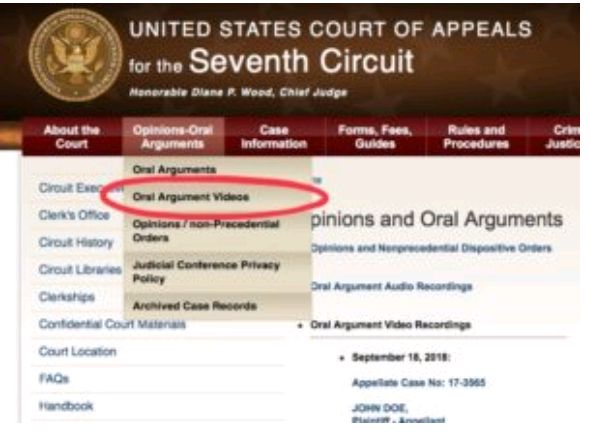Those who follow the workings of the U.S. Court of Appeals for the Seventh Circuit are no doubt accustomed to visiting the court's website (http://www.ca7.uscourts.gov) to read the daily release of published opinions or to listen to the court's audio recordings of oral arguments. The former are available here; the latter are available here and normally are posted in the afternoon, a few hours after that morning's oral arguments.
Court watchers now have a new option available from the Seventh Circuit: video of certain oral arguments. The court reviewed the practices of other courts around the country that video-recorded their oral arguments, and, on May 1, 2018, it adopted Operating Procedure 11, which allows for a "request for video-recording" to "be submitted to the Clerk of the Court not later than one week before oral argument." The Operating Procedure further provides an opportunity for the parties to object and leaves the decision in the "sole discretion" of the argument panel. (The Operating Procedure notes that "[t]he panel will normally deny the request if one member objects.")
The court appears to have put its new procedure—and video-recording capabilities—to use for the first time this week in Doe v. Purdue University et al., No. 17-3565, for which the court heard oral argument on September 18. The panel consisted of Circuit Judges Diane Sykes (presiding), Amy Barrett, and Amy St. Eve. The court has posted the video-recording on its website under the dropdown for "Opinions-Oral Arguments" (pictured below and available here). The audio recording is also available in the normal location.

Interestingly enough this case offered something of a hint as to how the court intends to use its new procedure. A third-party requested the recording, to which the appellant (Doe) consented and the appellees (essentially Purdue) objected (all accomplished by letter). The court "considered and rejected the objection" in a one-page order. The underlying letters are not available on the court's docket, so the substance of the appellees' unsuccessful objection remains a mystery.
The content of this article is intended to provide a general guide to the subject matter. Specialist advice should be sought about your specific circumstances.


